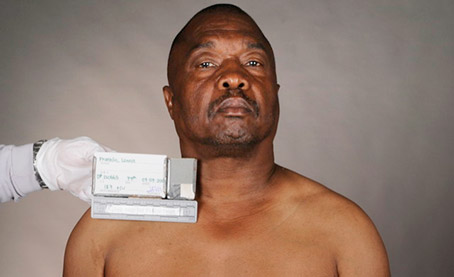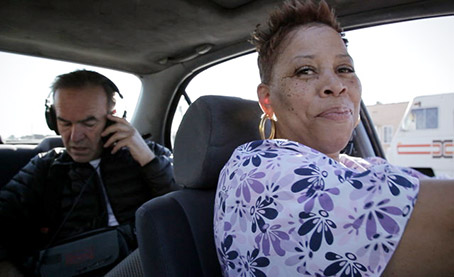|
I can't help thinking that one of the things that defines a Nick Broomfield documentary is that it starts off as one thing and ends up being about something else entirely. Thus his investigation of the case of female serial killer Aileen Wuornos was transformed into a film about those who were seeking to profit from her conviction. Twenty-four years later, Broomfield chose to look into the case of Lonnie David Franklin Jr, who was arrested and charged with being the serial killer who terrorized South Central Los Angeles over a period of 25 years and whom the media had dubbed 'The Grim Sleeper'. How, Broomfield wondered, could this popular and well-known member of a closely knit South Central community have been responsible for so many murders without arousing the suspicion of his friends of family? But what starts out as an investigative documentary evolves into an eye-opening portrait of the still strained relationship between the black community and the police, and a troubling insight into the almost casual manner in which women at the lowest social strata are used and abused.
It all starts in archetypal Broomfield manner with the camera following the director, kitted out with his trademark headphones and boom mic, as he approaches his first potential interviewees. Within seconds he's in conflict, his first on-camera chat disrupted by shouts from across the street from a trio of Lonnie's neighbours, angry at the idea that others might be in any way badmouthing their friend. Broomfield thus gives them the chance to put their case and they paint a convincing picture of Lonnie as a well-liked pillar of this small community, and regard the idea that he could be a serial killer as patently absurd. He dealt in stolen cars, they cheerfully reveal, and he was damned good at it. But murder? No way. At this point the direction in which the film will subsequently head seems clear – Broomfield digs a little deeper, talks to the right people and starts to uncover evidence that has been overlooked by the police that will strongly indicate that they have the wrong man, a Thin Blue Line for the 21st Century if you will.
Except that's not what happens. A short while later, Gary, one of the neighbours who was so vociferously defending Lonnie's honour, contacts Broomfield and reveals on camera that there was one incident involving his friend that gave him pause for thought. Not long after, his fellow advocate Richard is doing likewise, recalling a time when Lonnie suddenly and aggressively grabbed a woman on the street and the police appeared from nowhere and hauled them both in. Despite being held in separate cells for several hours, however, both were set free without being formally booked for any crime.

The police handling of the case is called into question at an early stage, and we even learn that some time prior to Lonnie's arrest, a policeman was arrested for the murders but freed without charge. As Broomfield digs deeper, he is aided and often accompanied by former prostitute and reformed crack addict Pam Brooks, a cheerful, streetwise bundle of seemingly fearless energy who opens doors for the filmmaker and introduces him and his camera operator (Broomfield's son Barney) to apprehensive streetwalkers and addicts alike as "my friends from England." And the more he digs, the more troubling the information Broomfield turns up becomes, specifically about the shocking manner in which the women at the bottom of the South Central social ladder were treated by the police and by Lonnie himself.
Over the course of the film, Lonnie emerges as a sexual predator who spent his evenings cruising the streets and picking up women for encounters that no-one seems willing to describe in positive terms. He also took (sometimes pornographic) polaroid pictures of just about all of the girls he enticed into the back of his van or led home to his garage, a collection of 180 photos of women that the police (inaccurately) claim has all since disappeared and may well have been murdered, and which prove to be the most damning evidence against him. That he had an accomplice on these sleazy night-time jaunts, one who openly recalls them for Broomfield's camera, and that his friends were well aware of his nocturnal activities and even find them amusing, speak volumes about the low regard in which these women are held by the district's menfolk.
Mind you, even this seems to pale when compared to the attitude of the city's police force to the women most likely to be victims of these crimes, callously dismissing assaults on prostitutes and drug addicts with the acronym NHI, or No Human Involved. The news that the police were aware that they were dealing with a serial killer a staggering 22 years before they released this information to the public genuinely beggars belief, as does the revelation that a recording of the man they suspected of being the killer making a 911 call was held back for just as long. Had it been released earlier, might public help in identifying the owner of that voice have prevented a number of subsequent murders? Tragically, we'll never know. Given that the response of one police representative when challenged about their lack of progress on the case was apparently an astonishing "He's only killing hookers," it's perhaps no surprise that the police refused all requests to take part in the film.
The one ray of light in the whole affair is the women of an activist group known as the Black Coalition Fighting Back Serial Murders, whose take-no-crap determination, forthright views and ferociously funny mocking of police prejudice and incompetence is genuinely inspiring. A bedrock of reason and progressive action, their crowning moment here comes when city Mayor Vilaraigosa and Police Chief Charlie Beck call a press conference to crow about the years of hard work they put in to catching the killer, only to have the Coalition's determined founder Margaret Prescod grab the microphone from them and very publicly put the record straight.

As so often with Broomfield, there's sometimes a sense that we're watching a work in progress instead a polished final product, but that's very much part of what makes his films stand out from the documentary feature crowd, and allows him to include material that other filmmakers might discard because of their disruptive effect on the pace and flow. How else could he comfortably have shoehorned in a sequence where an ad-hoc tour of the crime scenes is cut smartly short by the sound of nearby gunfire, or an attempt to procure information from a crack addict that gleans precious little that brings us creepily close to the pitch-black void of a local crack house.
There is, however, one thing that none of the reviews that I've so far read has commented on, but which did make me feel just a little uneasy. As far as I am aware, at the time of writing – despite being arrested and charged with the murders back in July of 2010 – Lonnie Franklin has yet to stand trial and be convicted of the crimes of which he is accused. The evidence uncovered by Broomfield is pretty damning, but in a country whose constitution states that an individual is by default innocent until proved guilty – and by proved that means convicted in a court of law – there is a real danger here that he has already been tried and convicted not by the courts but by the media, a machine in which Broomfield is admittedly only a single cog. Persuasive though many of the testimonies are here, there's a big difference between making a statement in court – where false testimony can lead to charges of perjury and possible imprisonment – and stating them on camera, where the worst that is likely to happen is that you will later be accused of being a liar.
The film certainly leaves a few questions unanswered, not least why two of Lonnie's closest friends are forcefully defending him one minute and a short while later are contacting Broomfield to share stories that cast him in a more suspicious light. Why would they do that? Did they suddenly have a crisis of conscience and realise that maybe what they previously regarded is no big deal was in fact a little incriminating? If so, why did they feel such an urgent need to share that with a visiting film crew? Were they star stuck at the idea of appearing in a documentary feature film? More to the point, were they paid for their contributions to the film? Or, given the later revelations of the depth of their involvement in Franklin's predatory activities, were they just looking to go on the record to cover their own backs?
Even so, Tales of the Grim Reaper still makes for sobering and eye-opening viewing, and paints a sorry picture of the progress we like to think has been made in the realms of racial and social equality. On this score Broomfield saves his strongest emotional gut punch for the final minutes, when a number of the 180 women labelled by the police as missing and presumed dead, all of whom have been tracked down by the determined Pam, recall their treatment as addicts and prostitutes at the hands of men. I was left with the glum and sorry sense that as a gender we still have a lot to answer for.
|